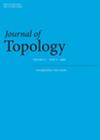全局代数k理论
IF 0.8
2区 数学
Q2 MATHEMATICS
引用次数: 8
摘要
引入代数k理论的一个全局等变改进;这里的“全局等变”是指所有有限群的同时相容作用。我们的构造将一种特定类型的分类输入数据转化为一个全局的Ω $\Omega$ -谱,它跟踪所有有限群G$ G$ -等变无限循环空间。由此产生的全局代数k理论谱是将表示k理论或“天鹅k理论”包装成一个高度结构化对象的严格方式。本文章由计算机程序翻译,如有差异,请以英文原文为准。
Global algebraic K-theory
We introduce a global equivariant refinement of algebraic K-theory; here ‘global equivariant’ refers to simultaneous and compatible actions of all finite groups. Our construction turns a specific kind of categorical input data into a global -spectrum that keeps track of genuine -equivariant infinite loop spaces, for all finite groups . The resulting global algebraic K-theory spectrum is a rigid way of packaging the representation K-theory, or ‘Swan K-theory’ into one highly structured object.
求助全文
通过发布文献求助,成功后即可免费获取论文全文。
去求助
来源期刊

Journal of Topology
数学-数学
CiteScore
2.00
自引率
9.10%
发文量
62
审稿时长
>12 weeks
期刊介绍:
The Journal of Topology publishes papers of high quality and significance in topology, geometry and adjacent areas of mathematics. Interesting, important and often unexpected links connect topology and geometry with many other parts of mathematics, and the editors welcome submissions on exciting new advances concerning such links, as well as those in the core subject areas of the journal.
The Journal of Topology was founded in 2008. It is published quarterly with articles published individually online prior to appearing in a printed issue.
 求助内容:
求助内容: 应助结果提醒方式:
应助结果提醒方式:


